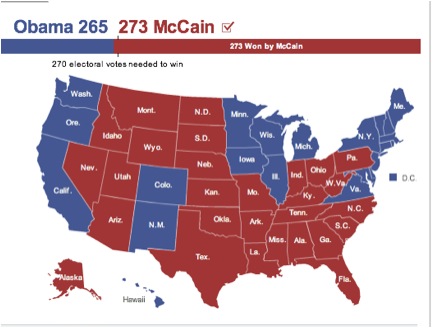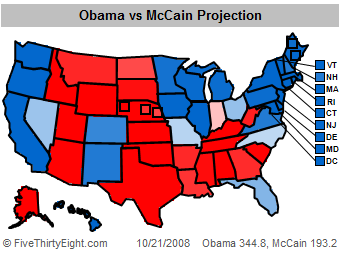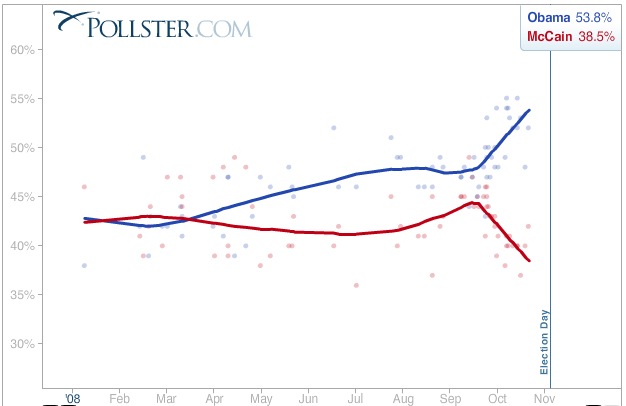Okay, you’ve heard me make point after point about How John McCain is a completely inadequate and inappropriate choice for president, but you haven’t heard a great deal about why Obama would be a good choice. The fact is, it’s simply easier to point out McCain’s shortcomings–there are just so damned many of them–and hearing about Obama’s policy points is a lot less exciting. Nevertheless, thats what people should hear–and frankly, what you should have heard by now.
The fact is, getting word out about his policy is just about all Obama has been doing for the length of the campaign–talking about his tax policy here, his health insurance plans there, his foreign policy goals elsewhere, and so on. Not to mention that his policies are right there on his website, and have been all along. There’s no mystery here; despite McCain & Palin insinuating that Obama is some shadowy unknown, his political philosophy and policy goals have been out there for a long time–a few years, in fact, as much of it was outlined in his second book, The Audacity of Hope.
So if you don’t know where he stands on the policies, then it’s hardly his fault. Still, like I said, this stuff can be a lot less exciting, and so a lot of people probably haven’t gotten around to it, even at this late date. Despite knowing the policies, I’ve procrastinated in putting this post together–it’s been on the slate for some time now.
So what are Obama’s policies, and how do they compare favorably with McCain’s? Let’s begin with three big ones, Taxes, Iraq, and Foreign Policy:
Taxes: Obama will cut taxes most for the poor, starting at a 5% drop for the neediest Americans; this will taper off to a 2% cut for someone making $66,000, 1.5% for someone making $227,000, and will go to zero at about $250,000. He then starts raising taxes, the hikes becoming most notable for people making over half a million dollars a year, but the biggest increases–almost 8%–for people with incomes over $3 million a year. McCain, on the other hand, gives the poorest people a paltry 0.2% tax cut–virtually nothing–and then grows the tax cuts for people making more money, with people having incomes in the millions getting the biggest breaks. McCain calls Obama’s policy “socialism” on the premise that Obama is redistributing the wealth–except that McCain’s plan does exactly the same thing, just in the other direction.
You may have heard McCain or Palin claiming that Obama is going to raise taxes on everyone making more than $102,000; that’s a knowing lie distorting Obama’s plan to raise the payroll tax ceiling so that rich people no longer get away with paying a miniscule amount relative to their total income. Currently, the payroll tax only applies to the first $102,000 of anyone’s income, so middle-class families get socked, but wealthy people end up paying a far lower percentage of their total income. McCain’s lie presumes that Obama will tax everyone making more than $102,000, but Obama has made it crystal clear that he would create a “donut hole” where income between $102,000 and $250,000 would not be subject to payroll taxes, but everything above that would be.
Bottom line: if you make less than $250,000 a year, Obama won’t raise your taxes, and if you make less, he’ll cut them. If you make less than $112,000 a year, Obama will cut your taxes more than McCain will–that includes “Joe the Plumber.”
Additionally, McCain’s tax plan, which mostly benefits the wealthy, will also cost a lot more–it will cost a trillion dollars ($1,000,000,000,000) more than Obama’s tax cuts over the next ten years.
Other tax policies: Obama plans a windfall profits tax on oil companies which he’d give back to regular taxpayers, a move criticized by many as meaningless as the oil companies will simply raise prices to compensate. Obama would eliminate taxes on seniors making under $50,000, and would simplify tax filing for everyone. He would end tax breaks for companies sending jobs overseas. Finally, Obama would eliminate all capital gains taxes on startups and small businesses.
McCain’s big plans include cutting taxes mostly for the wealthy, lowering corporate tax rates (from 35% to 25%), enacting a “gas tax holiday” (which is criticized as being just as ineffective as Obama’s windfall profits tax), and would at least partially privatize Social Security, though he vehemently denies the last, insisting on calling it “establishing personal accounts”–which is simply another way to say “privatization.” On his site, there are a lot of other ‘proposals,’ but mainly they talk about “keeping taxes low” for individuals and small businesses (not actually lowering them), not providing health care costs for businesses, and saving everyone money by magically solving the energy crisis and balancing the budget. Like most of McCain’s plans, he says he will pay for all of this by cutting earmarks and wasteful spending–though he has not detailed where the money could be cut, except for a few small examples. It is generally recognized that there is nowhere near enough waste to pay for even a fraction of McCain’s plans, and although McCain shows the willingness to eliminate what waste there is, he has provided no evidence that he would be any more effective than any other president in eliminating such waste, which is usually protected by the entrenched and established powers-that-be in the government. In other words, all talk, no plans–just make McCain president and all of Washington will kneel before him and relinquish all it power and treasures to him.
In essence, McCain plans to maintain the conservative course: lower taxes even more for corporations and the wealthy, give a pittance at best for the working classes, and generally stop any programs that would benefit the poor or middle class at the expense of corporations and/or the rich–stuff like comprehensive health care.
Iraq: Obama calls for withdrawing US troops on a timeline that would have most of our people out of Iraq by the middle of 2010–a plan that both Bush and McCain initially attacked, but now Bush has adopted it and McCain called the basic concept reasonable. Obama’s plan would pull out troops based upon conditions on the ground, allowing for changes if the situation merits. At the same time, there would be an emphasis on diplomacy, training Iraqi troops to handle security more independently, arranging international efforts to prevent humanitarian crises, and emphasize Iraqi responsibility for stabilizing matters–something there was no incentive for so long as the U.S. promised to keep troops in Iraq indefinitely. While the plan is not the wholesale, immediate bugout that many liberals have called for, Obama explains that the car has been driven into a ditch and you can’t just abandon it and run–you have to get the car out of the ditch, and that’ll take more time, lives, cost, and effort than many would prefer. But it has to be done.
McCain, on the other hand, wants to stay in Iraq until there is a “stable, prosperous, and democratic state in Iraq that poses no threat to its neighbors and contributes to the defeat of terrorists.” Since these terms are subjective at best, there is no telling when McCain would get us out of Iraq, or how much more money and lives will be poured into that effort over the next X number of years. McCain lists as priorities (1) political reconciliation and stable government, (2) creating a “vibrant, growing” Iraqi economy, and (3) pressuring Syria and Iran to lay off (because that has worked so well up to now). McCain does not specify on his web page, but he foresees an indefinite American presence in Iraq over the next several decades, perhaps even over a century and more, in the same manner that the US maintains bases in Japan and Germany. His “hundred years” comment is usually represented as a hundred years of war; this is often disputed because McCain claims that there will be peace in Iraq in just a few years under his stewardship. Of course, if that doesn’t happen, then we will have the long, indefinite war.
Foreign Policy: Obama emphasizes controlling nuclear material and curbing the spread of nuclear weapons and technology, but the heart of his foreign policy lays in the re-establishment of diplomacy. Diplomacy to deal with Iran and other hostile states, but also the rebuilding of diplomacy and good relations with our allies, both current and potential. There would be a strong focus on the Israeli-Palestinian conflict, a new initiative to fight poverty, a consolidation of alliances within NATO, and new alliances with Asian partners.
McCain’s site does not have a specific section on Foreign Policy, instead listing such issues under “National Security” and “Homeland Defense,” emphasizing the “dangerous world” paradigm. McCain leads with intelligence work to fight terrorism, relying on missile defense programs, and increasing the size of the military and modernizing it. Elsewhere he outlines a policy to fight nuclear proliferation, somewhat similar to Obama’s. For the Middle East, McCain emphasizes defense of Israel, and takes a notably bellicose stance against Iran. Reviewing the page on McCain’s site addressing the Middle East, it is full of fear-provoking language–words like danger, threat, regime, violence, and catastrophe, using action words such as tough, sanction, cannot allow, launch, and force. Everyone knows about McCain’s “joke” about bombing Iran and his general support for such plans.
McCain is also known for his idea to build a “League of Democracies,” essentially a plan to establish a permanent “Coalition of the Willing,” in other words, a group of nations that would basically do what the U.S. wants them to do; the body would be exclusive, like a group of kids making a club where only those they approve of can join. As can be inferred from so much else that is and is not stated on McCain’s site, this would be much less about diplomacy and much more about throwing our weight around, with the assistance of whomever we can get to stand behind us.
It should be no wonder, then, that in worldwide polls, Obama is vastly favored over McCain; a large number of countries have strong preferences for Obama, and in only a few countries is there more support for McCain–but McCain’s support never surpasses the “don’t know/refuse to answer” category. McCain’s support is greatest in Georgia (no surprise there), the Philippines, and Cambodia, with a razor-thin lead in Laos. In Lithuania and Pakistan McCain and Obama are tied. Obama, however, holds commanding leads, being ahead of McCain by 50% or more in at least a dozen countries, with strongholds in Europe, Canada, Australia, and Africa.
There should be little or no doubt that Obama would be far, far more popular and effective on the world stage than would McCain.
In Short, Obama has (1) tax plans that reverse the Bush-McCain trend of shifting wealth to corporations and the rich, giving more tax cuts to the middle class in an economically responsible fashion; (2) a clear but responsible plan for withdrawal from Iraq that does not involve permanent bases or a potentially endless war; and (3) a foreign policy strong with diplomacy versus McCain’s aggressive, bellicose stance, which may explain why most of the world is praying for an Obama victory.
More policy reviews tomorrow.



